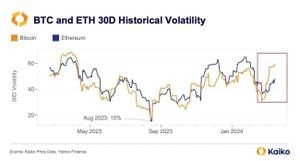Friedrich Merz's Conservative party, the CDU/CSU, has taken center stage as the victor of the German parliamentary elections held recently, marking a significant shift from Chancellor Olaf Scholz's Social Democrats (SPD). This electoral outcome is fuelling discussions around the future of Germany's political framework, especially amid rising pressures from the Alternative for Germany (AfD) party.
Market observers and political analysts are striving to digest the ramifications of this election, which saw the highest voter turnout since the reunification of Germany in 1990. This indicates not only public interest but also a complex layer of discontent among voters, as captured by various analysts. "The largest voter turnout since reunification in 1990 is another ray of hope. Germans may be dissatisfied, but they are not disenchanted with politics," said Watson news, highlighting the paradox of engagement amid dissatisfaction.
Friedrich Merz now faces the Herculean task of forming a ruling coalition, ideally without the AfD. With various parties, including Social Democrats and the Greens, needing to compromise, his party's ability to govern effectively is under scrutiny. Swiss outlet Tamedia outlines the precarious nature of this process: "If Merz fails in the task of forming a coalition, his dream of becoming chancellor is likely to be shattered shortly before the finish line." This reflects the urgent need for collaborative governance as Germany's position within Europe hangs heavily on its domestic stability.
The German political environment is rife with challenges, not least of which is the looming influence of the AfD. With its rising popularity, the AfD's position imposes significant hurdles for Merz, who wishes to steer clear of partnership with this far-right party. Such hesitation is echoed by various political commentators, warning against the potential fallout from any leniency toward the AfD. Decisions on coalition partners are time-sensitive, as the need for swift governing responses grows due to external pressures, such as anticipated tariffs from the US and geopolitical dynamics involving Ukraine.
Le Temps, addressing Germany's need for strong leadership, warns, "Germany cannot afford to be the 'sick man' of Europe," underscoring the urgent requirements placed on the new government. The economic recovery remains fragile, with both internal and external pressures compelling immediate governmental action. A delay could render the country ineffective amid international scrutiny and expectations.
Political commentators across various media have voiced concerns about the potential for compromise as Merz constructs his governing coalition. The Neue Zürcher Zeitung (NZZ) remarked on Merz's precarious position by stating, “Merz can now only hope...a single coalition partner will be enough.” The inherent risks of coalition governance will only amplify as the CDU/CSU navigates its policies against the backdrop of growing AfD rhetoric.
What external factors will shape the future course of German politics? Observers suggest they are likely to focus on how Germany manages its relations within Europe. Expectations on Merz's government are tempered with the acknowledgment of today's political climate, characterized by increasing skepticism about Germany's traditional alliances. Some analysts opine this sentiment is echoed internationally, as global players, particularly across Europe, look for stability and decisiveness from Berlin.
Despite these uncertainties, there is cautious optimism due to increased public engagement and scrutiny. This could incentivize the new government to act decisively, balancing domestic politics with the demands of leadership on the European stage. Meanwhile, challenges abound, including how quickly and effectively Merz can assemble his government and address foundational economic and migration reforms necessary for revitalizing Germany's position.
Going forward, all eyes will be on Merz. Whether he can effectively lead his party within the fragile coalition paradigm remains to be seen, and this terrain necessitates navigations not merely through domestic waters but across complex international relations. A stable Germany is not just about fulfilling political promises; it’s about ensuring the nation doesn’t fall behind amid its EU responsibilities.
The interplay of coalition dynamics, public expectation, and external pressure paints a complicated picture for the future of German governance under Merz. Will the new chancellor be able to steer Germany through the challenges posed by both domestic adversaries and international landscapes? Only time will tell, but the road appears filled with obstacles demanding astute navigation.



